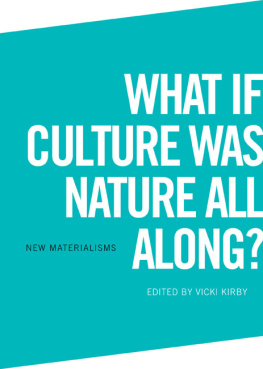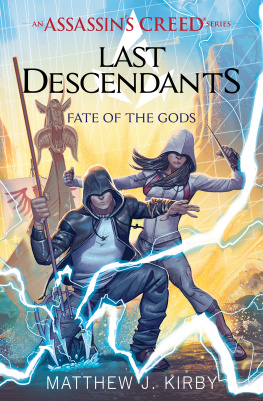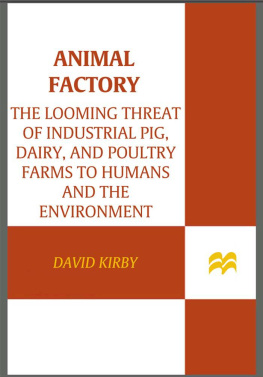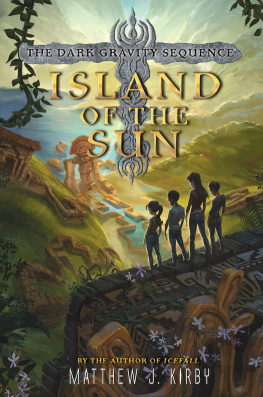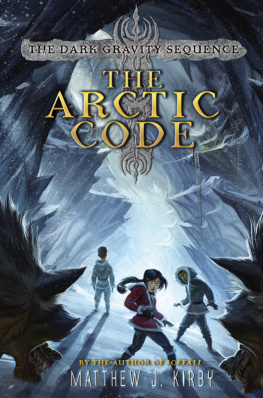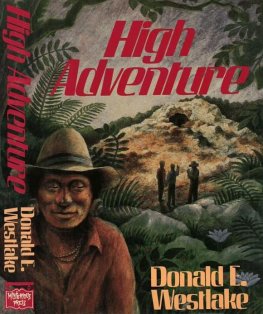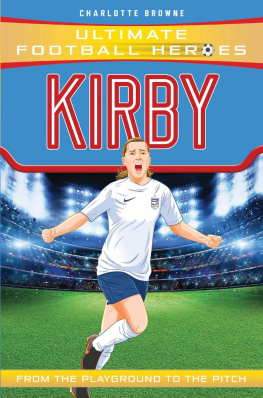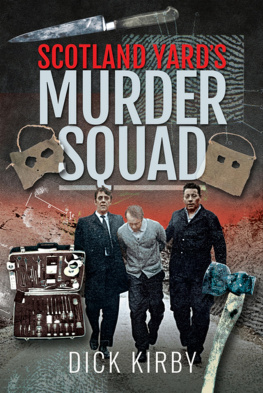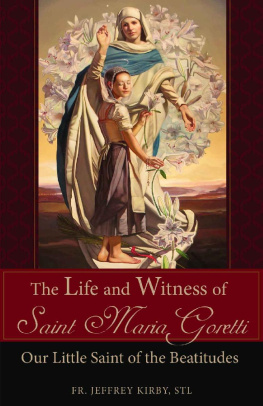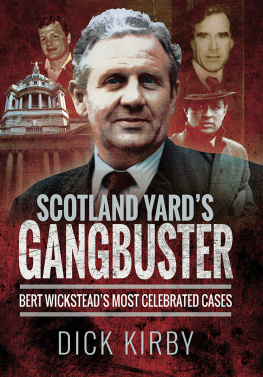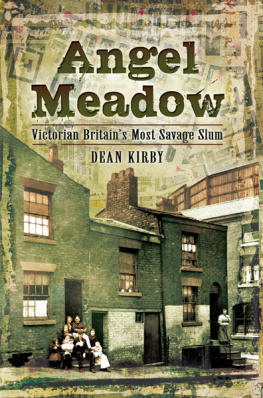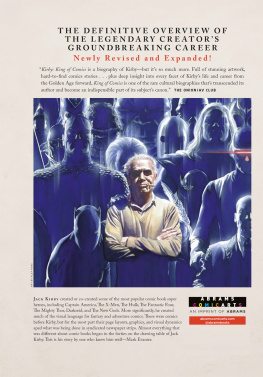Kirby - What If Culture Was Nature All Along?
Here you can read online Kirby - What If Culture Was Nature All Along? full text of the book (entire story) in english for free. Download pdf and epub, get meaning, cover and reviews about this ebook. City: Edinburgh, year: 2017, publisher: Edinburgh University Press, genre: Romance novel. Description of the work, (preface) as well as reviews are available. Best literature library LitArk.com created for fans of good reading and offers a wide selection of genres:
Romance novel
Science fiction
Adventure
Detective
Science
History
Home and family
Prose
Art
Politics
Computer
Non-fiction
Religion
Business
Children
Humor
Choose a favorite category and find really read worthwhile books. Enjoy immersion in the world of imagination, feel the emotions of the characters or learn something new for yourself, make an fascinating discovery.
- Book:What If Culture Was Nature All Along?
- Author:
- Publisher:Edinburgh University Press
- Genre:
- Year:2017
- City:Edinburgh
- Rating:3 / 5
- Favourites:Add to favourites
- Your mark:
- 60
- 1
- 2
- 3
- 4
- 5
What If Culture Was Nature All Along?: summary, description and annotation
We offer to read an annotation, description, summary or preface (depends on what the author of the book "What If Culture Was Nature All Along?" wrote himself). If you haven't found the necessary information about the book — write in the comments, we will try to find it.
What If Culture Was Nature All Along? — read online for free the complete book (whole text) full work
Below is the text of the book, divided by pages. System saving the place of the last page read, allows you to conveniently read the book "What If Culture Was Nature All Along?" online for free, without having to search again every time where you left off. Put a bookmark, and you can go to the page where you finished reading at any time.
Font size:
Interval:
Bookmark:

What if Culture was Nature all Along?
New Materialisms
Series editors: Iris van der Tuin and Rosi Braidotti
New Materialisms asks how materiality permits representation, actualises ethical subjectivities and innovates the political. The series will provide a discursive hub and an institutional home to this vibrant emerging field and open it up to a wider readership.
Editorial Advisory board
Marie-Luise Angerer, Karen Barad, Corinna Bath, Barbara Bolt, Felicity Colman, Manuel DeLanda, Richard Grusin, Vicki Kirby, Gregg Lambert, Nina Lykke, Brian Massumi, Henk Oosterling, Arun Saldanha
Books available
What if Culture was Nature all Along?
Edited by Vicki Kirby
Critical and Clinical Cartographies: Architecture, Robotics, Medicine, Philosophy
Edited by Andrej Radman and Heidi Sohn
Books forthcoming
Architectural Materialisms: Non-Human Creativity
Edited by Maria Voyatzaki
What if Culture was Nature all Along?
Edited by Vicki Kirby
EDINBURGH
University Press
Edinburgh University Press is one of the leading university presses in the UK. We publish academic books and journals in our selected subject areas across the humanities and social sciences, combining cutting-edge scholarship with high editorial and production values to produce academic works of lasting importance. For more information visit our website: edinburghuniversitypress.com
editorial matter and organisation Vicki Kirby, 2017
the chapters their several authors, 2017
Edinburgh University Press Ltd
The Tun Holyrood Road, 12(2f) Jacksons Entry, Edinburgh EH8 8PJ
Typeset in 11/13 Adobe Sabon by
IDSUK (DataConnection) Ltd, and
printed and bound in Great Britain by
CPI Group (UK) Ltd, Croydon CR0 4YY
A CIP record for this book is available from the British Library
ISBN 978 1 4744 1929 1 (hardback)
ISBN 978 1 4744 1930 7 (webready PDF)
ISBN 978 1 4744 1931 4 (epub)
The right of Vicki Kirby to be identified as the editor of this work has been asserted in accordance with the Copyright, Designs and Patents Act 1988, and the Copyright and Related Rights Regulations 2003 (SI No. 2498).
Contents
Acknowledgements
A big thank you to Iris van der Tuin for her early appreciation of our collective efforts and her vision and encouragement in helping us to realise this project. I would also like to thank those participants in Mull, our regular reading group, who did not make it into the book. The conversations and general good cheer of several floating Mull members over several years of the books gestation have been invaluable; Naama Carlin, Holi Birman, Jasmin Kelaita, Suzi Hayes, Sophie Robinson, Andr Etiamby, Nayana Bibile and James Banwell. And one thing we can agree upon is that The Cricketers Arms and Strawberry Hills Hotels have never let us down.
The University of New South Wales, School of Social Sciences, has provided welcome support with a small grant towards the indexing of the book, which is much appreciated.
Foreword
Where to Begin?
A visit to Sydney by Iris van der Tuin, one of the editors of the New Materialisms Series with Edinburgh University Press, first alerted most of the contributors to this collection that we were doing something unusual. The doing involved our participation in a regular research workshop that we affectionately called Mull, and it was here that we committed to reading the most challenging texts in our individual research areas. We werent too fussed about the subject matter or whether we all shared an interest in a particular author; the agreement was to read together and to encourage an environment of curiosity. I have mentored all of the contributors in one way or another over many years, and as a result we have all become comfortable with our differences. Looking back however, I can see that in the beginning we were especially satisfied with the outcome of these get-togethers we could spot an arguments logical misstep and follow its repetitions with reasonable ease, enjoying the advantage of a group hunt. But as cornering and despatching our quarry with increasing alacrity began to disappoint I think it was only then that the more difficult task of learning how to read with an author how to find the value that might be hidden in faltering hesitations and contradictions, how a weak spot might be an opportunity to be mined rather than a flaw to be condemned became our main objective.
My own view is that we were learning how to read grammatologically, and yet this description tells us very little. Deconstruction is the methodology that eschews methodology, indeed, its paradoxical identity is a mirror maze of confusion for the novice. Not surprisingly, its linguistic reductionism and hermeticism have drawn criticism, and in the main, deconstruction has appeared peripheral and even redundant in relation to contemporary political and sociological concerns. Although I have never accepted this reading it has been popular nevertheless; a ready excuse for dismissal without the bother of actual engagement. However this perspective appears to be shifting, and in regard to this particular project, scholars such as Claire Colebrook, Cary Wolfe, David Wood, Michael Marder and Timothy Morton argue that deconstruction might ventilate current debates in posthumanism and deep ecology, and complicate the impasse between the humanities and the sciences. Although this books collective argument is not an application of deconstruction Derridas name is rarely mentioned many essays deploy deconstructive strategies to explore what might be called natural sociologies.
To explain this; a conventional reading of Derridas well-known axiom, no outside text, is usually interpreted to mean no outside culture. However, my own revision of this apparent enclosure to read, no outside nature, discovers a comprehensive landscape where nature is literate, numerate and social, and where the exceptional status and identity of the human is one of quantum dis/location. Importantly, we have not left the text in this revision, nor privileged nature instead of culture, because, quite simply, there is no outside, no remainder that is not already involved and evolving as text. Inevitably, the very notion, text, assumes the status of a question in this reading. As a result, matters of methodology take centre stage because the separation of subject from object, or even one position from another, becomes uncertain. This in turn complicates the triumphalism of negative critique and dismissal that can too easily motor and justify new materialisms not epistemology but ontology, not the subject but the object, not language but matter instead, refracting individual positions through tangled intimacies. Rather than rely on these blunt and censoring adjudications our collective commitment is to enable and encourage curiosity through an ethics of generosity, one that refuses to refuse an argument outright, or too quickly. We may well fall over in the attempt to re-read through complicities, but we may also achieve a less predictable outcome by attempting such an exercise.
A signature ingredient in all these contributions is the question, where to begin?, and for this reason there is heavy reliance on feminist and critical theories whose sustained scrutiny of the nature/culture division and its conservative legacies have proven transformative. Although there is healthy scepticism about all oppositional logic that rests on an unquestioned a priori, the aim is to shift the temperament of these logics rather than to discount them automatically. A powerful intervention, for example, is to search for the usefulness in arguments we might otherwise denounce by rendering certain words and their meanings more pliable, even delinquent.
Next pageFont size:
Interval:
Bookmark:
Similar books «What If Culture Was Nature All Along?»
Look at similar books to What If Culture Was Nature All Along?. We have selected literature similar in name and meaning in the hope of providing readers with more options to find new, interesting, not yet read works.
Discussion, reviews of the book What If Culture Was Nature All Along? and just readers' own opinions. Leave your comments, write what you think about the work, its meaning or the main characters. Specify what exactly you liked and what you didn't like, and why you think so.

